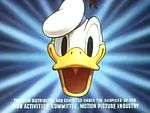The Spirit of '43
| The Spirit of '43 | |
|---|---|
| Donald Duck series | |
|
Title card | |
| Directed by | Jack King |
| Produced by | Walt Disney |
| Voices by |
Clarence Nash Fred Shields (narrator) |
| Animation by | Ward Kimball |
| Studio | Walt Disney Productions |
| Release date(s) |
|
| Color process | Technicolor |
| Running time | 6 minutes |
| Country | United States |
| Language | English |
| Preceded by | The New Spirit |
The Spirit of '43 is an American animated World War II propaganda film created by Walt Disney Studios in 1942 and released in January 1943. The film stars Donald Duck, and arguably contains the first appearance of a prototype for the character Scrooge McDuck, not named in the film. It is a sequel to The New Spirit. The purpose of the film is to encourage patriotic Americans to file and pay their income taxes faithfully in order to help the war effort. The repeated theme in the film is "Taxes...To Defeat the Axis."
The film, along with Der Fuehrer's Face and others like it, was released on DVD by Disney in 2004. The film is currently in the public domain and therefore can be seen on many gray market videos and DVD's
The title is an allusion to the expression "Spirit of '76" (referring to the sentiment around the American Revolution in 1776).
Plot
In the film, Donald Duck is portrayed as an everyman who has just received his weekly pay. He is met by two physical manifestations of his personality — the classic "good angel on one shoulder, bad devil on the other shoulder" dilemma common to cartoons of the time — identified as the "thrifty saver" and the "spendthrift."
The "good duck" appears as a slightly elderly duck with a Scottish accent who wears a kilt and Scottish cap and urges Donald to be thrifty with his money so he can be sure to pay his taxes for the war effort. The "bad duck" appears as a zoot suit-wearing hipster who urges Donald to spend his duly earned money on idle pleasures such as "good dates". The good angel reminds of other "dates": the dates when his taxes are due.[1] The narrator explains that Americans should "gladly and proudly" pay their income taxes which are higher that year "thanks to Hitler and Hirohito."
A tug-of-war ensues between "spend" and "save" with Donald caught in the middle. Eventually the two sides give way and crash on opposite ends of Donald to reveal the "true" selves: the doors of the bad duck's club are revealed to be swastikas and the bad duck himself turns out to bear a resemblance to Hitler (his bow tie is now a swastika and he has grown Hitler's characteristic mustache), while the wall the good duck has crashed up against resembles the flag of the United States. The narrator then asks the audience if they are going to "spend for the Axis" or "save for taxes". Having made the seemingly obvious choice, Donald is assumed to shake hands with the bad duck, but it is revealed that he heads over to the bad duck to punch him out at the last second. He then goes to proudly pay his taxes with the good duck.
The second part of the film is a montage entirely recycled from The New Spirit, showing how the taxes are being used to make planes, bombs, ships, and other war materials. It then shows them being used against Axis forces, along with the repeated slogan "Taxes...to (bury, sink, etc.) the Axis", accompanied by the opening bars of Beethoven's Fifth Symphony (the "V for Victory" theme).
Notes
- ↑ In the 1940s, unlike modern times, income taxes were paid directly by workers every three months rather than directly deducted from employee paychecks and paid by employers on behalf of the employees.
External links
| Wikimedia Commons has media related to The Spirit of '43. |
